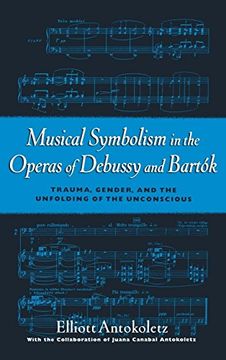Compartir
Musical Symbolism in the Operas of Debussy and Bartók: Trauma, Gender, and the Unfolding of the Unconscious (en Inglés)
Elliott Antokoletz (Autor)
·
Oup Usa
· Tapa Dura
Musical Symbolism in the Operas of Debussy and Bartók: Trauma, Gender, and the Unfolding of the Unconscious (en Inglés) - Elliott Antokoletz
$ 219.590
$ 439.170
Ahorras: $ 219.580
Elige la lista en la que quieres agregar tu producto o crea una nueva lista
✓ Producto agregado correctamente a la lista de deseos.
Ir a Mis Listas
Origen: Estados Unidos
(Costos de importación incluídos en el precio)
Se enviará desde nuestra bodega entre el
Lunes 15 de Julio y el
Lunes 22 de Julio.
Lo recibirás en cualquier lugar de Chile entre 1 y 3 días hábiles luego del envío.
Reseña del libro "Musical Symbolism in the Operas of Debussy and Bartók: Trauma, Gender, and the Unfolding of the Unconscious (en Inglés)"
Two early twentieth-century operas -- Debussy's Pelleas et Melisande (1902) and Bartok's Duke Bluebeard's Castle (1911) -- transformed the traditional major/minor scale system into a new musical language. This new language was based almost exclusively on interactions between folk modalities and their more abstract symmetrical transformations. Elliott Antokoletz reveals not only the new musical language of these operas, but also the way in which they share a profound correspondence with the growing symbolist literary movement as reflected in their libretti. In the symbolist literary movement, authors reacted to the realism of nineteenth-century theatre by conveying meaning by suggestion, rather than direct statement. The symbolist conception included a new interest in psychological motivation and consciousness manifested itself in metaphor, ambiguity, and symbol.In this groundbreaking study, Antokoletz links the new musical language of these two operas with this symbolist conception and reveals a direct connection between the Debussy and Bartok operas. He shows how the opposing harmonic extremes serve as a basis for the dramatic polarity between real-life beings and symbols of fate. He also explores how the libretti by Franco-Belgian poet Maurice Maeterlinck (Pelleas et Melisande) and his Hungarian disciple Bela Balazs (Duke Bluebeard's Castle) transform the internal concept of subconscious motivation into an external one, one in which fate controls human emotions and actions.Using a pioneering approach to theoretical analysis, Antokoletz, explores the new musico-dramatic relations within their larger historical, social psychological, philosophical, and aesthetic contexts.
- 0% (0)
- 0% (0)
- 0% (0)
- 0% (0)
- 0% (0)
Todos los libros de nuestro catálogo son Originales.
El libro está escrito en Inglés.
La encuadernación de esta edición es Tapa Dura.
✓ Producto agregado correctamente al carro, Ir a Pagar.

